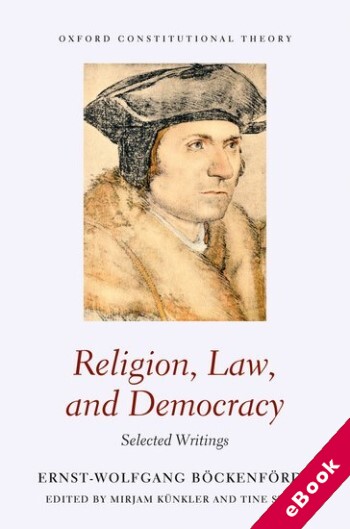We will be closed from 5pm Thursday 17th April for the Easter Bank Holidays, re-opening at 8.30am on Tuesday 22nd April. Any orders placed during this period will be processed when we re-open.

The device(s) you use to access the eBook content must be authorized with an Adobe ID before you download the product otherwise it will fail to register correctly.
For further information see https://www.wildy.com/ebook-formats
Once the order is confirmed an automated e-mail will be sent to you to allow you to download the eBook.
All eBooks are supplied firm sale and cannot be returned. If you believe there is a fault with your eBook then contact us on ebooks@wildy.com and we will help in resolving the issue. This does not affect your statutory rights.
Ernst-Wolfgang Böckenförde (1930-2019) was one of Europe's foremost legal scholars and political thinkers. As a scholar of constitutional law and a judge on Germany's Federal Constitutional Court (1983-1996), Böckenförde was a major contributor to contemporary debates in legal and political theory, to the conceptual framework of the modern state and its presuppositions, and to contested political issues such as the rights of enemies of the state, the constitutional status of the state of emergency, citizenship rights, and the challenges of European integration. His writings have shaped not only academic but also wider public debates from the 1950s to the present, to an extent that few European scholars can match. As a federal constitutional judge and holder of a trusted public office, Böckenförde has influenced the way academics and citizens think about law and politics. During his tenure on the Court, several path-breaking decisions for the Federal Republic of Germany were handed down, including decisions on the deployment of missiles, the law on political parties, the regulation of abortion, and the process of European integration.
This second volume in the first representative edition in English of Böckenförde's writings brings together his essays on religion, law, and democracy. The volume is organized in five sections: I. the Catholic Church and Political Order; II. State and Secularity; III. the Theology of Law and its Relation to Political Theory; IV. Norms and the Principle of Human Dignity; and V. Excerpts from a biographical interview. Sections I, II, III, and IV are preceded by an editors' introduction to the articles as well as running editorial commentary to the work.